| | | | | | | Presented By Equinor | | | | Axios World | | By Dave Lawler ·Oct 14, 2021 | | Welcome back to Axios World. - We've got a jam-packed edition (1,802 words, 7 minutes) tonight, with stops in Afghanistan, Venezuela and the future.
Situational awareness: The U.S. has been elected to rejoin on the UN Human Rights Council, three years after former President Trump walked out on the panel citing bias against Israel. | | | | | | 1 big thing: Biden under pressure over frozen Afghan funds |  | | | Afghans wait outside a bank in hopes of withdrawing cash, watched by a Taliban fighter. Photo: Wakil Kohsar/AFP via Getty | | | | With the Afghan government and economy starved of cash, the Taliban are pressing their claim to the roughly $8 billion in Afghan foreign reserves that have been frozen by the U.S. Why it matters: Afghanistan is barreling into a humanitarian crisis, and donor countries and international institutions have cut off the aid that accounted for some 75% of the previous government's budget. - The U.S., EU and others are providing humanitarian assistance through third parties on the ground, but experts fear the economy is shriveling up due in part to a dire cash shortage.
- "Right now, with assets frozen and with development aid paused, the economy is breaking down," UN Secretary-General António Guterres said this week. Between $7 billion and $8 billion of the roughly $9 billion in frozen Afghan assets are held in the U.S.
- Those reserves are the "No. 1 issue" on the Taliban's agenda in talks with foreign interlocutors, according to a source familiar with those discussions.
- Taliban representatives asked the U.S. to unfreeze the funds last weekend in the first meeting between the sides since the U.S. completed its withdrawal on Aug. 31.
The other side: The Biden administration appears set to leave the Afghan assets in limbo for some time. - State Department spokesperson Ned Price said Tuesday that the reserves are among the "carrots and sticks" the U.S. has to influence the Taliban, and decisions on such issues will be based on the Taliban's "conduct."
- A senior administration official told Axios that the funds couldn't be released "with the snap of a finger" due to the fact that the U.S. has not recognized the Taliban government, the existing terrorism sanctions against the group and its leaders, and the legal cases in which "several groups of plaintiffs are seeking to attach the funds."
- The official wouldn't specify which litigation, but the families of 9/11 victims have brought lawsuits against Afghanistan for harboring al-Qaeda.
- "Releasing the reserves is no guarantee [that the] Taliban will actually use it effectively to solve problems," the official added. "The Taliban was in control in the '90s and was not a responsible economic steward and they have shown zero evidence they will be responsible stewards now."
"The administration is in a real pickle here," says Laurel Miller, a former top State Department official on Afghanistan and now director of the Asia program at the International Crisis Group. - "On the one hand, there is certainly an argument, technically speaking, for not releasing the assets to a government that is not recognized," Miller says.
- "There is also a political argument that may be the largest obstacle, that no matter what the facts are about who these assets belong to, it could be construed as giving billions of dollars to the Taliban."
- "On the other hand, the fact that these assets are frozen is one of the factors that is doing damage to the Afghan economy, because there is a liquidity crisis. There is a lack of cash in the Afghan banking system," Miller notes.
State of play: The UN is urgently seeking additional funding and warning that the crisis will deepen as winter approaches. Already, only 5% of Afghan households have enough to eat. Between the lines: The senior U.S. official argued that the reserves are a "separate issue" from the U.S. response to the humanitarian crisis and that releasing them would "not solve the lasting economic challenges Afghanistan is facing." - But as Afghanistan's cash crunch deepens, the pressure to release them will grow.
|     | | | | | | 2. Interview: Venezuelan opposition leader on negotiating with Maduro | 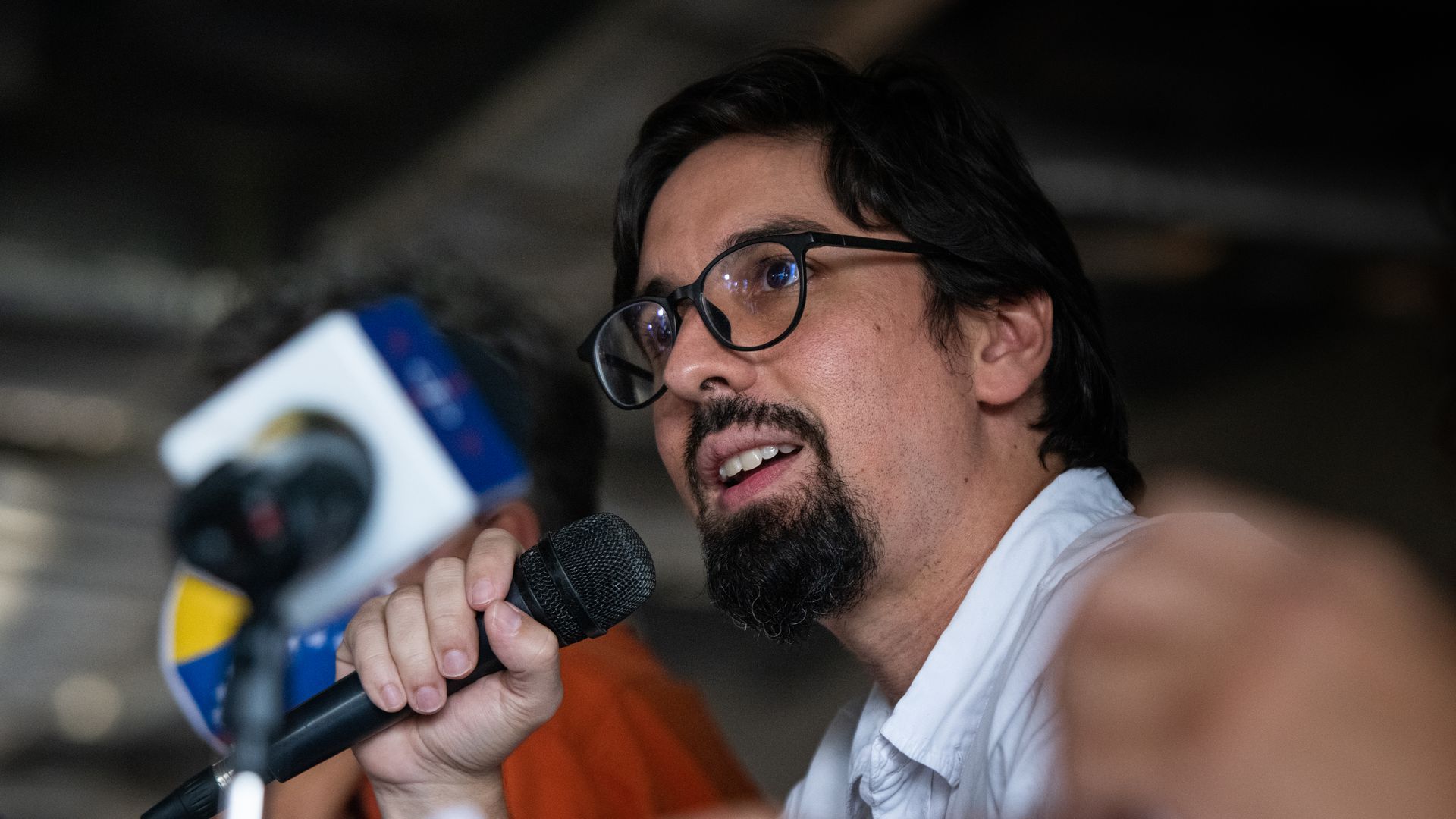 | | | Freddy Guevara, an opposition leader, speaks during a news conference in Caracas, Venezuela, in August. Photo: Gaby Oraa/Bloomberg via Getty Images | | | | Venezuelan opposition leader Freddy Guevara has lost his freedom twice at the hands of Nicolás Maduro's regime, but he now sees a "window of opportunity" to bring about free and fair elections, he told Axios' Oriana Gonzalez in an interview. Why it matters: Guevara and other opposition delegates have been holding negotiations in Mexico with officials from Maduro's government since September. The opposition is pressing for free presidential elections, while Maduro's side wants sanctions relief and access to Venezuelan assets overseas. - Some of those assets are frozen, while others are held by the government of Juan Guaidó, whom the U.S. recognizes as Venezuela's legitimate interim leader.
What he's saying: Four previous sets of negotiations with Maduro since 2014 have collapsed, and the opposition "cannot guarantee that [the current talks] are not going to fail," Guevara said. - Yes, but: "We are convinced we need to … attempt right now because we see a window of opportunity."
State of play: The negotiations, mediated by Norway, have already yielded agreements on humanitarian issues, such as child nutrition programs and the pandemic response. Now, Guevara said, "the main topics" will be on the table. - The opposition is specifically asking for the next presidential elections, not scheduled until 2024, to happen "as soon as possible," Guevara said.
- They're calling for reform of the National Electoral Council — which is fully controlled by the Maduro regime and has overseen a series of fraudulent elections — and for a new judicial system with independence from Maduro.
- Maduro and his top lieutenants are under international sanctions, which they hope will be lifted. They also want the opposition to recognize the government as legitimate.
The backstory: Guevara was arrested in July and accused of "terrorism" and "treason," but he was released a month later to take his place at the negotiating table. - Guevara previously spent three years living inside the Chilean Embassy while facing the threat of arrest.
Go deeper |     | | | | | | 3. Energy crisis complicates climate talks |  | | | Illustration: Annelise Capossela/Axios | | | | Major global economies are facing damaging shortages of fossil fuels just as they're about to convene to discuss how to transition away from them. Driving the news: A combination of weather-related issues (many of which are related to climate change), unexpected demand and planned outages has sent natural gas and coal prices through the roof, Axios' Felix Salmon and Andrew Freedman write. - China's energy shortage has already caused high-tech manufacturing centers to close their doors.
- India is in even worse shape, with much less ability to bring new power sources online.
- In the U.K., the surge in natural gas prices saw many companies go bust, while the EU has been reminded of how uncomfortably reliant it is on Vladimir Putin's Russia for its energy needs.
What's next: The UN Climate Summit in Glasgow begins on Oct. 31. - This crisis is likely to make China and India more reluctant to commit to phasing out coal-fired power plants in the near term. The current crisis demonstrates that they need all the energy they can get, whatever the source.
The bottom line: The world is reliant on fossil fuels for much-needed growth, and the transition to alternatives isn't moving fast enough. - "Pressures on the energy system are not going to relent in the coming decades," writes the International Energy Agency in its latest World Energy Outlook, released on Wednesday.
|     | | | | | | A message from Equinor | | How Equinor is becoming a leader in America's offshore wind industry | | | 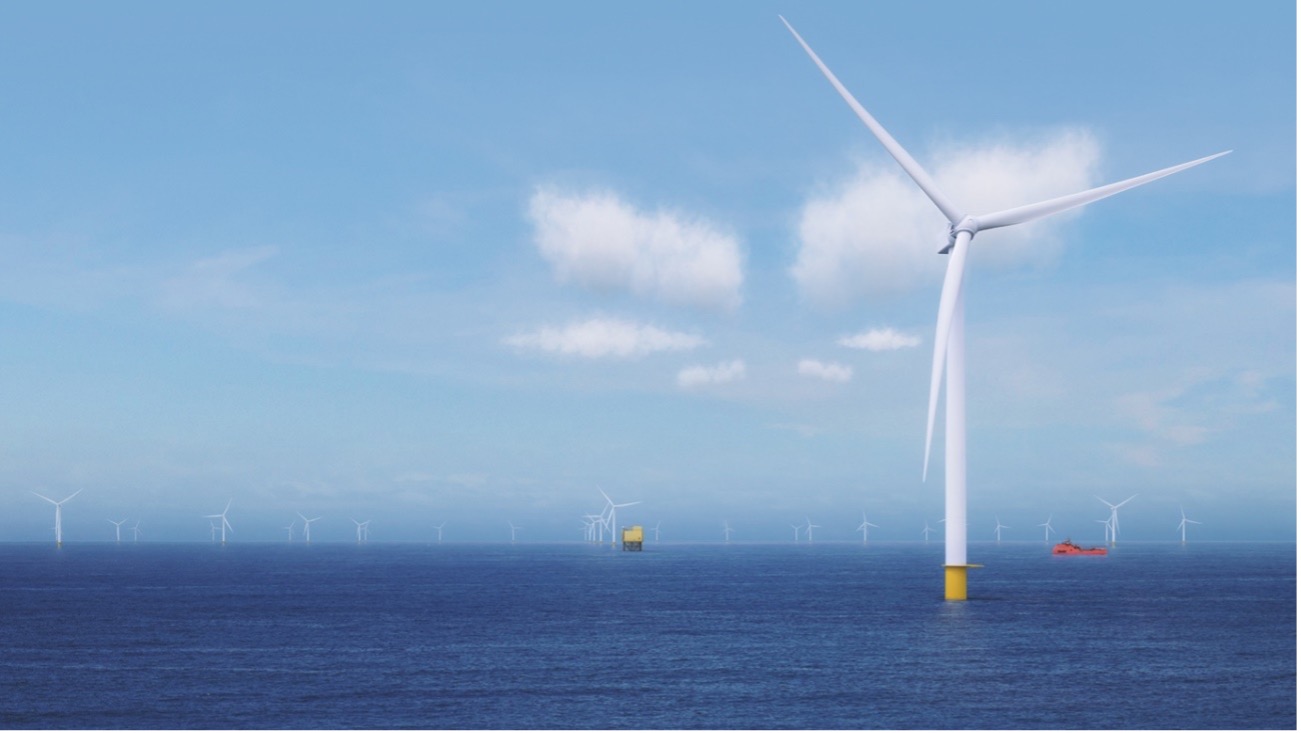 | | | | Equinor plans to power 2,000,000 homes in New York with homegrown, renewable energy — that will also boost the economy and generate jobs. With a net-zero target for 2050, Equinor is pursuing the development of the Empire Wind and Beacon Wind offshore wind projects in the U.S. | | | | | | Bonus: Where in the world? | 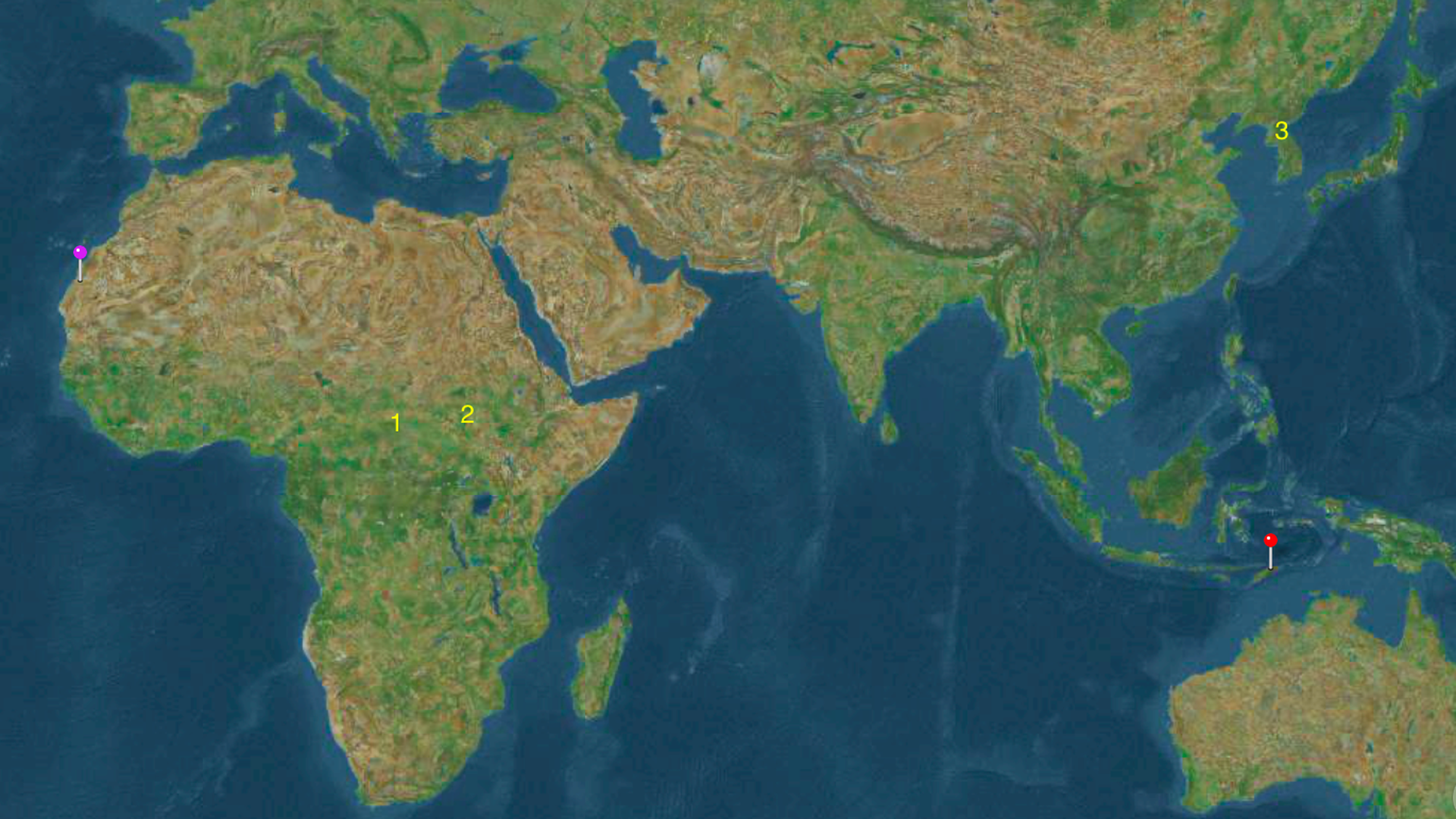 | | | Screengrab via Apple News | | | | You might need a compass to solve today's puzzle. Or at least to visualize one... - The three numbers and two pins all mark countries or territories that follow a certain pattern.
- Hint: The pins are pretty tough. It might help to start with No. 3 and go from there.
Scroll to the bottom for the answers. |     | | | | | | 4. Biden's awkward first visit from an African leader | 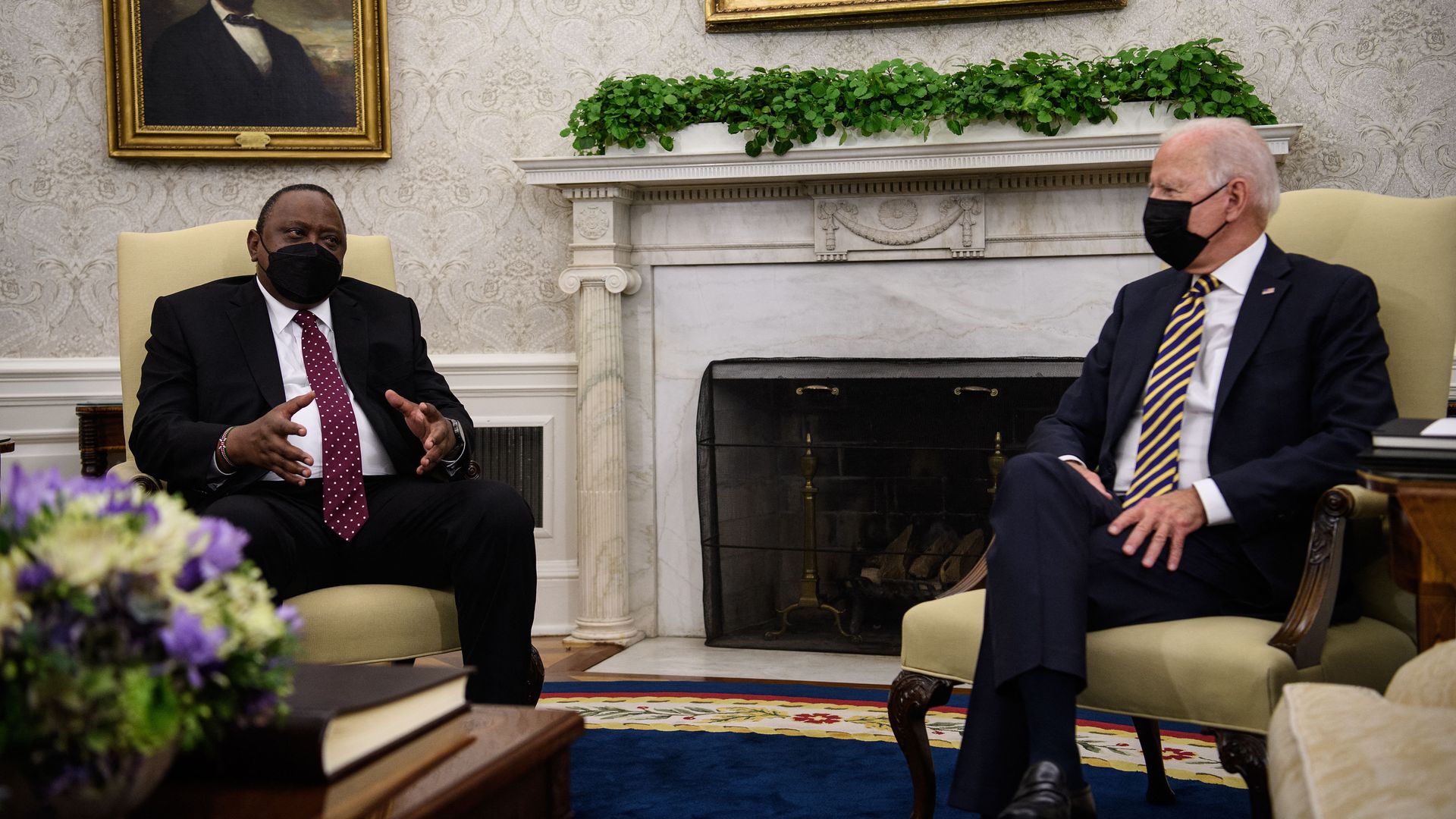 | | | Kenyatta with Biden in the Oval Office. Photo: Nicholas Kamm/AFP via Getty | | | | President Biden hosted Kenyan President Uhuru Kenyatta at the White House today, where he announced that the U.S. will donate an additional 17 million doses of the Johnson & Johnson vaccine to the African Union. Why it matters: Biden is belatedly seeking to bolster U.S. engagement with the region, which has been a low priority as the administration goes all-in on countering China in the Indo-Pacific. But Biden's choice for the first African leader to visit his White House has raised some eyebrows. Driving the news: Kenyatta, who has pledged to crack down on corruption in Kenya, is under scrutiny after his family was named in the Pandora Papers for owning at least 11 offshore companies with more than $30 million in assets. - The controversy put the White House in a bind. In a pre-visit press briefing, a senior official was pressed as to why Biden would give such a prominent platform to someone facing corruption allegations.
- The official replied that "Kenyatta is very much an elder statesman in the region" whose voice carries weight, "including hopefully with [Ethiopian] Prime Minister Abiy."
Between the lines: The White House is hoping Kenya — a key U.S. security partner and the fifth-largest recipient of U.S. foreign aid — will press Abiy's government to show restraint in the current civil war. |     | | | | | | 5. Data du jour: What divides us |  Reproduced from Pew Research; Chart: Axios Visuals Pew polled 17 wealthy countries about the divisions that exist in their societies: politics, race, region and urban/rural. Key findings: In 14 of the countries, respondents were mostly likely to say that politics was a source of strong divisions, ranging from 90% in the U.S. and South Korea to 52% in the U.K., 44% in Canada, 39% in Japan and 33% in Singapore. - Second, almost across the board, was racial or ethnic backgrounds, with 71% in the U.S., 57% in Italy and 50% in Sweden saying they were a source of strong divisions (Singapore was again the lowest at 25%).
- People in France, South Korea and the U.S. were most likely to see strong divisions over both urban/rural AND religion — suggesting people in those countries might just feel the most divided overall.
The flipside: In all countries that were polled in both 2017 and 2021, the percentage of respondents believing diversity was good for society increased, often significantly. |     | | | | | | 6. Coming attractions: A future defined by migration |  | | | Illustration: Aïda Amer/Axios | | | | The best — and perhaps only — way to respond to huge changes in the climate and global demography may be to facilitate mass migration, Axios Future correspondent Bryan Walsh writes. In his new book "Move: The Forces Uprooting Us," political geographer Parag Khanna makes the case that the world is poised to enter a new era of mass migration in response to major environmental, economic and political changes — and this will be a largely positive change. - The single biggest factor is that rich countries will require large numbers of workers to keep their economies going in the face of population slowdown and decline.
- At the same time, many of the countries and regions that have a surplus of people will also come under increasing pressure from climate change, while many of the areas that will remain more livable in a hotter future — what Khanna calls "climate oases" — are comparatively empty.
Go deeper, and subscribe to Bryan's Axios Future newsletter. |     | | | | | | 7. Stories we're watching | 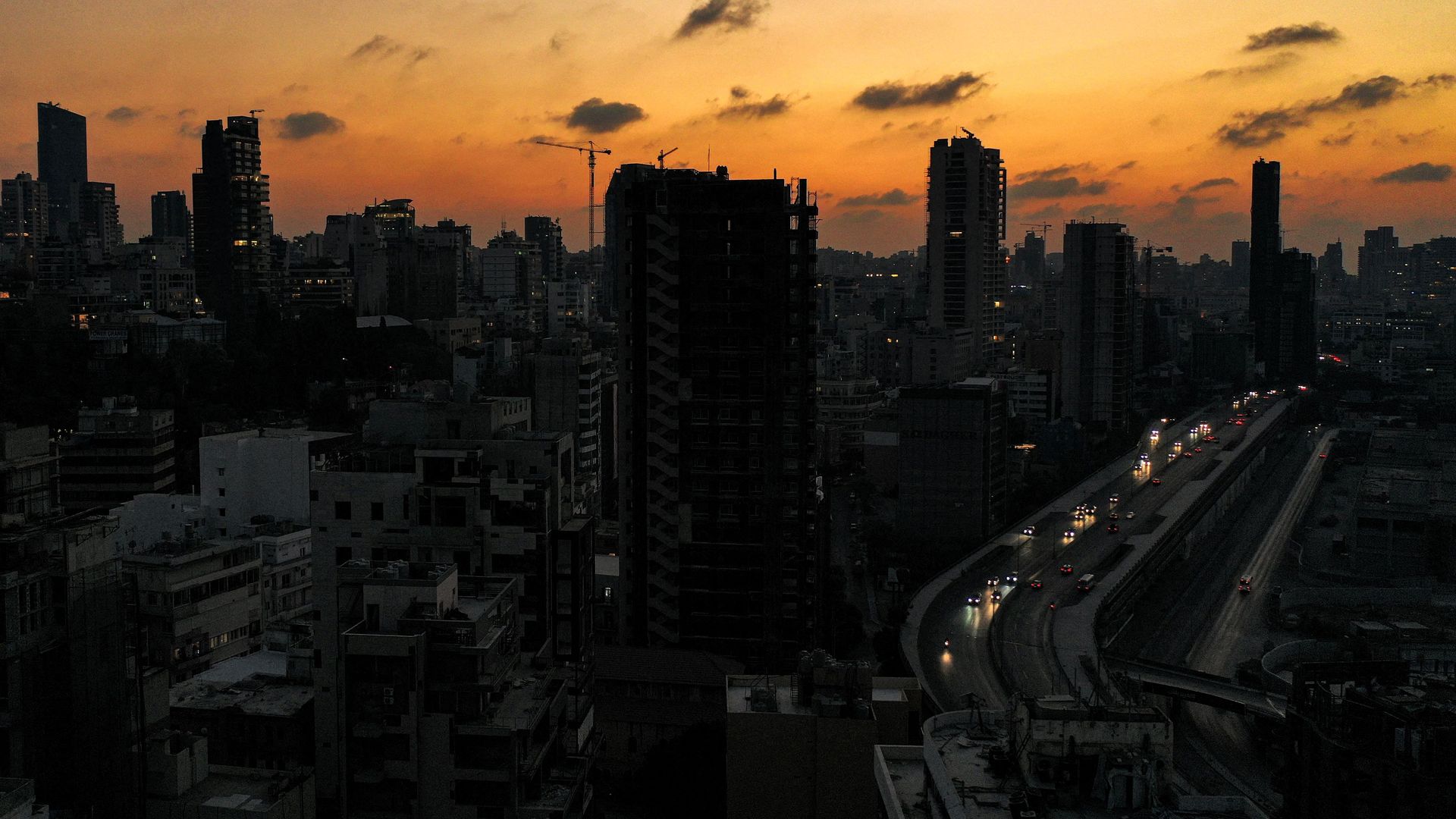 | | | Blackout in Beirut. AFP via Getty | | | - Japan heads for elections
- North Korea: Food crisis; Weapons showcase
- Biden's new Iran dilemma
- LinkedIn announces new app to avoid China scrutiny
- U.S. land borders opening for vaccinated travelers
- Pro-Iran bloc crashes in Iraq election, rejects results
- Afghan interpreter who rescued Biden escapes Afghanistan
Quoted: "Decisions on lockdowns and social distancing during the early weeks of the pandemic ... rank as one of the most important public health failures the United Kingdom has ever experienced." — From a report on the initial U.K. response to the pandemic |     | | | | | | A message from Equinor | | The energy transition is the defining opportunity of our time | | |  | | | | Equinor is helping create affordable, reliable and accessible energy by: - Accelerating the energy transition through the Empire Wind and Beacon Wind offshore wind developments.
- Planning to power 2,000,000 homes in New York with homegrown, renewable energy.
And more. Get the details. | | | | Answers: North Korea (#3), South Sudan (#2), East Timor, or Timor-Leste (red pin), Western Sahara (purple pin) and Central African Republic (#1). |  | | It'll help you deliver employee communications more effectively. | | | | | | Axios thanks our partners for supporting our newsletters. If you're interested in advertising, learn more here.
Sponsorship has no influence on editorial content. Axios, 3100 Clarendon Blvd, Suite 1300, Arlington VA 22201 | | | You received this email because you signed up for newsletters from Axios.
Change your preferences or unsubscribe here. | | | Was this email forwarded to you?
Sign up now to get Axios in your inbox. | | | | Follow Axios on social media:    | | | | | |













No comments:
Post a Comment